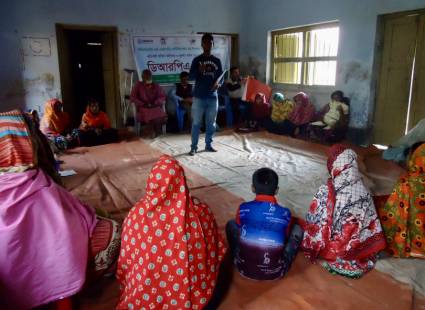Our Work
Mobilizing DPOs in Bangladesh
How a 2013 law has created advocacy avenues for disabled people's organizations

Human rights trainings by disabled people's organization leaders are powerful catalysts for persons with disabilities to claim their rights.
International human rights treaties do not automatically make changes in the lives of the people they protect, and the United Nations Convention on the Rights of Persons with Disabilities (CRPD) is no exception. Cognizant of the need for change agents, Article 4 of the CRPD specifically recognizes the role of disabled people's organiations (DPOs), also known as organizations of persons with disabilties (OPDs), in making rights a reality for the world's largest minority group. In Bangladesh, DPOs are proving the wisdom behind this theory of change.
Six years after ratifying the CRPD, Bangladesh enacted the Rights and Protection of Persons with Disabilities Act, 2013. This law recognized enforceable rights for Bangladeshis with disabilities for the first time. It also created a novel complaints procedure that enables persons with disabilities to seek remedies outside of court. In this context, BlueLaw International, an inclusive development firm, partnered with a Bangladesh Legal Aid and Services Trust, the National Grassroots Disability Organization, and the National Council of Disabled Women to launch an ambitious project aimed at empowering local DPOs to advocate for implementation of this law in 7 of Bangladesh’s 64 districts. These efforts build on HPOD's long-standing support for Bangladesh civil society, evidenced by the Bangla-language resources it has helped develop to strengthen the disability rights movement there, including a video on self-advocacy, the country's first disability rights law handbook for practitioners, and "I Will Speak Up for Myself," a primer on the rights of persons with intellectual disabilities.
Over three years, the project team developed a database of Bangla and Bangla Sign Language educational resources, trained over 6,000 persons with and without disabilities, and filed the country's first 22 complaints before the district-level committees created specifically for the purpose of adjudicating disability rights violations, all while documenting good practices to strengthen DPOs' advocacy. Although to date the outcomes of these complaints have been mixed, DPOs' efforts to activate this mechanism have yielded valuable lessons regarding effective advocacy strategies that can inform future DPO-led efforts. Although prospects for tangible governmental buy-in for effective, country-wide enforcement of this Act may be dim for now, DPOs have demonstrated their capacity to contribute meaningfully to operationalizing this important vehicle for domestic CRPD implementation.
HPOD's Director of Advocacy Initiatives Hezzy Smith, Executive Director Professor Michael Ashley Stein, and Senior Associate Janet E. Lord, along with International Disability Alliance's Md. Rejaul Karim Siddiquee, describe these lessons in "Mobilizing Disabled Peoples’ Organizations to Implement Bangladesh’s Disability Law," recently published in Oxford Academic's Journal of Human Rights Practice. This practice note is particularly relevant now with Bangladesh scheduled to appear before the UN Committee on the Rights of Persons with Disabilities in August and September of this year, as part of its first periodic review under the CRPD.

